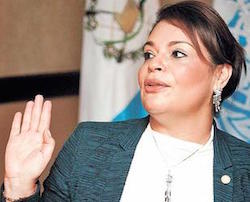In her first public remarks in three weeks, former Guatemala Vice President Roxana Baldetti has denied involvement in the corruption scandal that forced her resignation. Meanwhile, the ongoing investigation into the scandal looks increasingly as though it may involve judicial corruption.
On May 11, in a near 90-minute interview with Radio Sonora at her home in Guatemala City, Baldetti spoke of her May 8 resignation as Vice President. She said she stepped down for the well-being of the country’s government and democracy.
“It was a difficult week,” Baldetti stated in her first public appearance in 22 days, saying it was not an easy decision to resign. “There have been tears.”
Nonetheless, she denied involvement with a fraud ring in the country’s customs agency (SAT) known as “La Linea” that was uncovered on April 16. The alleged leader of the ring was her personal secretary, Juan Carlos Monzon.
Click through the presentation below to view the links between alleged La Linea members and the President’s Office.
Baldetti asserted her name has not appeared in phone conversations between alleged La Linea members obtained by the Attorney General and International Commission Against Impunity in Guatemala (CICIG) via wiretaps. She added that nicknames used in these communications, such as “la Dos,” “la Señora,” and “la R,” (believed by some to be references to Baldetti) could refer to anyone, even President Otto Perez Molina’s wife.
Baldetti expressed her willingness to cooperate with the CICIG and the Attorney General’s ongoing investigations into La Linea, although she claims she has been wrongly implicated. So far, 27 people have been detained.
On May 11, President Molina introduced his three nominees to replace Baldetti as Vice President. His recommendations will be sent to Congress, where the final selection will be approved.
InSight Crime Analysis
On May 8, the same day of Baldetti’s resignation, investigations resulted in the arrest of three lawyers representing defendants in the La Linea case. The lawyers are accused of running a so-called “Law Firm of Impunity,” offering their clients access to corrupt judges in Guatemala’s judicial system.
SEE ALSO: Guatemala News and Profiles
Corruption in Guatemala’s judicial system has consistently proven to be a major obstacle to reform and progress, promoting a culture of impunity and distrust. To remedy the situation, Ramon Cadena — the Central America director of the International Commission of Jurists (ICG) — has called for a purging of Guatemala’s justice system. He said that recent work by CICIG has demonstrated there are “judges who are part of structures that support or create impunity in the country.”
Indeed, fixing judicial impunity will be necessary if Guatemala is to advance in its fight against corruption; and it appears CICIG and the Attorney General are making efforts towards achieving this goal. As the La Linea case continues to advance, more corrupt judges and lawyers may yet be implicated in investigations.

